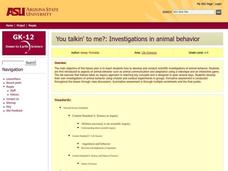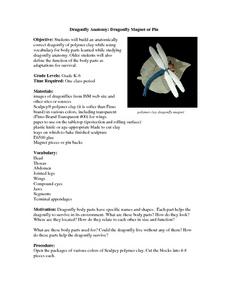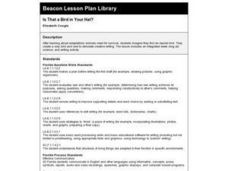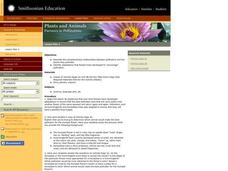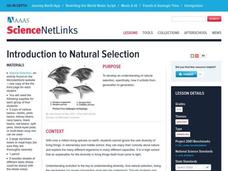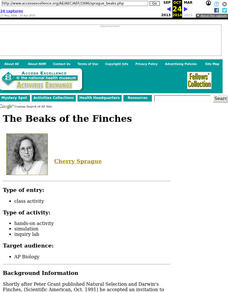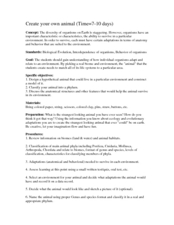Curated OER
Change or Adaptation
Students identify the adaptive forces in the life cycle of plants, animals, and humans, isolate and identify the role that change and adaptation play in extreme environments and research and write a short term paper using MLA citations.
Curated OER
You Talkin' To Me?: Investigations in Animal Behavior
Students investigate a variety of animal behaviors, examine various modes of animal communication, and develop a catalog analyzing, interpreting, and reporting their results.
Curated OER
The Creation of an Imaginary Species
Students explore the characteristics that distinguish different forms of animal life on Earth which are the results of natural selection and adaptations to their environment. The creatures are created using a game and then drawn by the...
Curated OER
Camouflage
Third graders collect insects and various bits of the insects' habitats in order to develop an understanding of how camouflage makes the insect fit to survive in its environment.
Curated OER
Keeping Warm When it is Cold: How does a polar bear keep warm?
Students make a model of a polar bear and discuss why fur/skin color is important. They also perform a simple experiment using black and white socks to determine how color affects temperature.
Curated OER
Woodland Animals and Their Habitat
Learners explore the natural environment through a video and nature sounds tape. They keep journal's of the unit's activities and vocabulary terms. They play a web of interdependence game and compose a list of forest animals and write...
Curated OER
Dragonfly Anatomy: Dragonfly Magnet or Pin
Students build anatomically correct dragonflies of polymer clay, use vocabulary for body parts, and define the function of the body parts as adaptations for survival.
Curated OER
The Art of Adaptation
Students examine and discuss animal adaptation. They read an article about snakes, conduct research on ways animals adapt, develop a diagram, and write a short story written from the perspective of the animal they researched.
Curated OER
Mammals: Mammals and Their Ways
Students study the difference between innate and learned behaviors. They observe the adaptations and behaviors of mammals in this series of lessons.
Curated OER
Structural and Behavioral Adaptations
Students participate in a role playing lab that allows students to experience how different beak adaptations play a role in the type of food the animal can eat, therefore playing a role in the survival of the species.
Curated OER
Mammals: Mammals and Their Ways
Students, in groups, observe, collect data, and analyze mammal behaviors.
Curated OER
Is That a Bird in Your Hat?
Second graders imagine they find an injured bird. They create a clay bird and nest to stimulate creative writing. The lesson includes an integrated week-long art, science, and writing activity.
Curated OER
Making Tracks
Students cast animal tracks on a field trip. They split up to capture tracks from different areas and use plaster of Paris to mold to the footprint. They bring casts back to class, create a negative mold and paint it black.
Curated OER
Gray Whales
Explore the majestic grey whale while deepening your understanding of animal adaptations. Grey whales from head to toe are specifically designed to fit their environment. Learners will examine the ways in which the flippers, head, body,...
Curated OER
How Organisms Live Successfully in Their Environments
Students compare the climate and organisms found in different environments, then give examples of how plants and animals adapt to their environment. They design an animal who adapts using camouflage to a made-up environment.
Curated OER
Web of Life - Role-Playing
Students role-play how organisms adapt to their environment. They play 20 questions with plant and animal habitats. They create a web of life to demonstrate how each plant and animal relies on the other for survival.
Curated OER
Elevation, Plants and Animals
Students determine whether elevation is one of the things that affect where and how plants and animals live. They read plant and animal physical descriptions and determine the environment where the animal might live.
Curated OER
Plants and Animals: Partners in Pollination
Students describe the complementary relationships between pollinators and the plants they pollinate, identify adaptations that flowers have developed to "encourage" pollination, and create and draw their own "designer" flowers.
Curated OER
Introduction to Natural Selection
Students develop an understanding of natural selection, specifically, how it unfolds from generation to generation. They work in small groups to perform an experiment using beans. They use a worksheet imbedded in this plan to guide their...
Curated OER
The Beaks of the Finches
Students become birds and are given "beak-types". After completing the simulation, students relate results to adaptations and natural selection. Extensions of the simulation allow for comparative results and include population genetics.
Curated OER
Natural Selection and Evidence Worksheet
Matching and fill-in-the-blank exercises give biology whizzes a chance to practice vocabulary associated with evolution. Terms to be reviewed focus on evidence for evolution, natural selection concepts, and some genetics words. You could...
Curated OER
WET Science Lesson #3: Comparison of Aquatic and Terrestrial Plants
Elementary life science explorers compare and contrast aquatic and terrestrial plants (elodea and soybeans) in a Venn diagram. Some background information is provided to support direct instruction, and general instructions are provided...
Curated OER
Structure and Function of Vertebrates - Reading/Notetaking Guide - Amphibians
A variety of questions are presented on the amazing amphibian. Life science intellectuals complete a life cycle diagram, describe characteristics and behaviors, and fill in a metamorphosis flowchart. Content level is geared toward middle...
Curated OER
Create Your Own Animal
Students design and create their own hypothetical animal. In this biology lesson, students identify the factors organisms need to survive. They classify their animals according to its correct phylum.



